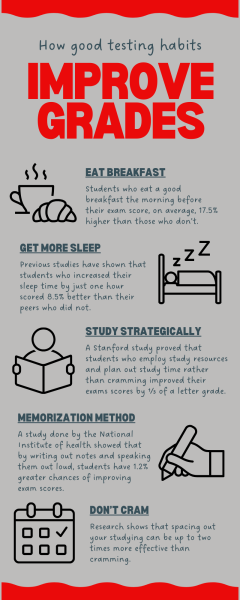Cultivate good study habits
When preparing for a test, it’s important to know the best and most effective ways to study. Setting up a structured schedule with intentional breaks can help keep your brain focused and on track. Additionally, finding a quiet space and eliminating distractions like phones, games and talking will make studying more beneficial.
Don’t cram
Many students make the mistake of waiting to study until right before a big test and trying to relearn a large amount of information in a short amount of time. Cramming puts a lot of stress on your brain, increasing anxiety, frustration and fatigue. Many times, these mental blocks cause students to forget critical information and score lower on the test, whereas spaced repetition promotes long-term memory retention. Instead of cramming, students should study over a period of time to retain and apply what they know.
Focus on weak spots
Knowing your weak spots on a subject helps greatly when preparing for a test. By looking at past assignments or quizzes, students can pinpoint areas they should focus on. This helps narrow down what can be a daunting amount of study material to what you need to work on most, which builds confidence and familiarity that can help you ace every question.
Rewriting your notes comes with many testing benefits. When taking the first set of notes during class, students often rush to get all of the information written down, which can hinder the processing of the material. When rewriting notes, students can actually take time to fully understand the information they need. It also organizes the material in one place for easy access when studying, instead of going through multiple sources of information. Students become better able to recall the notes during the test because they put effort into rewriting them in their own way.
The Protege Effect
The Protege Effect suggests that one of the most effective ways for students to learn stems from teaching another person the material. Research shows that by teaching, students understand, retain, recall and apply the material more successfully because they dig into the details of the information to effectively convey it to the other person.
Take a practice test
Taking practice tests add key benefits to your study session. Firstly, it can help uncover your weakest areas, so that you can study them before the real test. It also allows you to become familiar with any limits on time or resources and with the overall structure of the questions.
Sleep well the night before
A common theme before tests involves students sacrificing sleep for cramming or other things, but actually proves to be counterproductive and usually leads to more academic problems the following day. Missing out on sleep usually involves missing out on the REM cycle, where the brain processes information and commits it to memory. Therefore, students should sleep well the week leading up to their exam to improve memory recall and, consequently, receive better test scores.
Eat a good breakfast
Some high schoolers choose not to eat breakfast in the morning because they lack the time or fear of how the food will sit on their stomachs. However, eating breakfast improves concentration, attention span, and energy, which can be crucial when taking tests. Research has indicated that students who eat breakfast, especially at school closer to testing time, score, on average, 17.5% higher than those who skip breakfast










